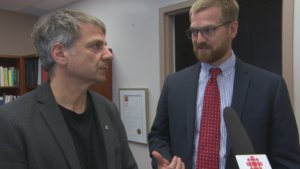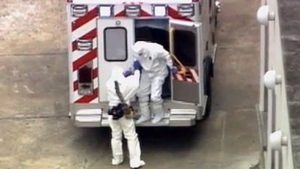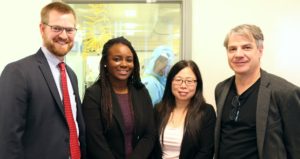Dr. Kent Brantly was 1st human given experimental treatment developed at National Microbiology Lab

A doctor who went to West Africa to fight the Ebola outbreak ended up being the successful guinea pig for an experimental treatment to fight the virus.
On Friday, he visited Winnipeg’s National Microbiology Lab to thank the scientists who saved him, in person.
Dr. Kent Brantly, a family physician from Fort Worth, Texas, was part of the medical response to the Ebola outbreak in Liberia in 2014. But while there, he contracted the deadly virus himself.
“I’m really glad to be able to meet you in person and tell you thank you,” Brantly said to Dr. Gary Kobinger, a professor at the universities of Laval and Manitoba, who was involved in developing the treatment.
Brantly’s recovery from what his doctors believed was death’s doorstep was widely credited to the drug ZMapp, an antibody cocktail designed at Canada’s National Microbiology Laboratory.

He reported feeling his fever break just 15 minutes after receiving the treatment.
“It’s really a tremendous honour and privilege to meet him. I’ve seen your picture, I’ve watched interviews with you, but it is a great privilege to say thank you to someone who saved my life,” Brantly said to Kobinger.
The treatment had never been used on a human being before, so when Brantly got sick, he was the first test subject.
“My story is just one of thousands,” he said. But “through the attention that was given to my story, we saw a tremendous boost in support of the work that’s required years and years in advance to have options available when an outbreak occurs.”

Kobinger, in return, thanked Brantly for his visit. He noted there was a huge team involved in both the treatment and in getting Brantly evacuated to a hospital in Atlanta, where he and another worker who had been exposed were treated.
“I would say that it’s very humbling and very touching that he took the time to come and say thank you,” Kobinger said.
Treating Brantly all happened so fast, he added.
“Despite the complexity of the environment, very important decisions can be made when people work together,” he said. “Extraordinary achievements can be can be made also when we work together to resolve and solve problems and find solutions.”
Before going to speak to a group at the University of Manitoba Friday, Brantly said he hopes what they take away from his visit is the importance of choosing compassion over fear.
“Choosing to do the right thing for your fellow human being rather than reacting out of fear and self preservation. That is not only true in my particular clinical story, but that’s true of the work that happens in the lab every day — is setting aside the fear of working with deadly diseases to do good for others.”
Brantly, who was the face of the Ebola fight on Time’s 2014 Person of the Year cover, is speaking at a brunch Saturday morning at McDermot Avenue Baptist Church.


